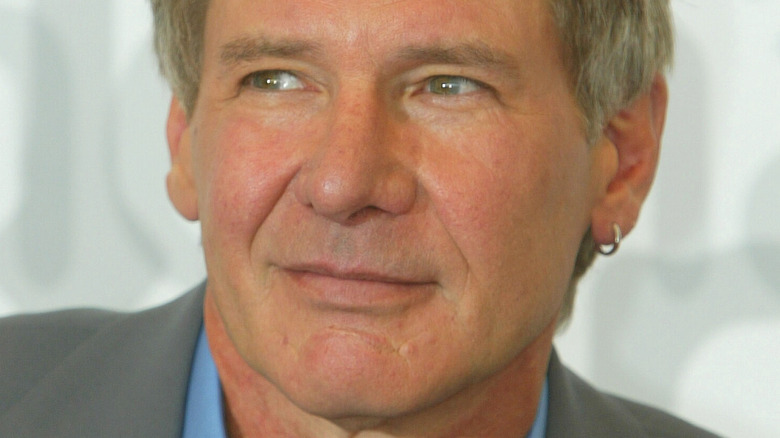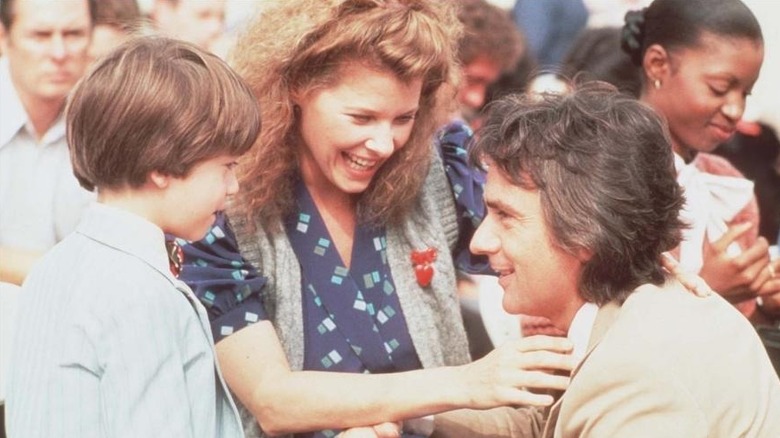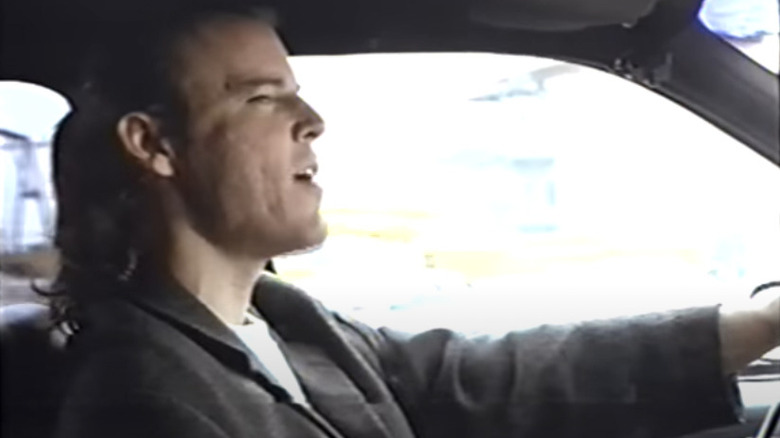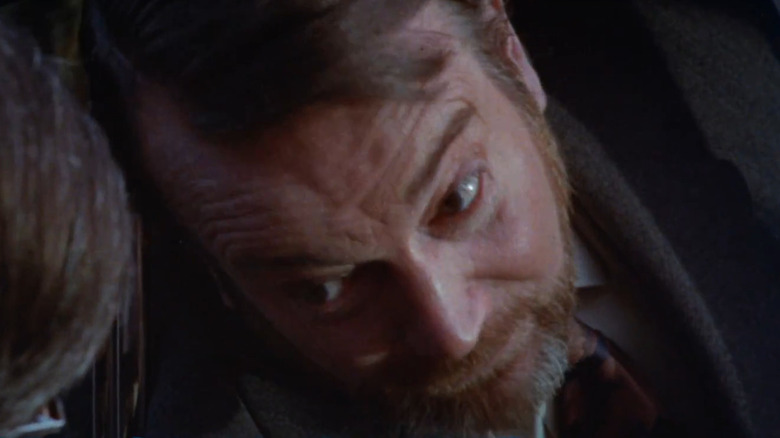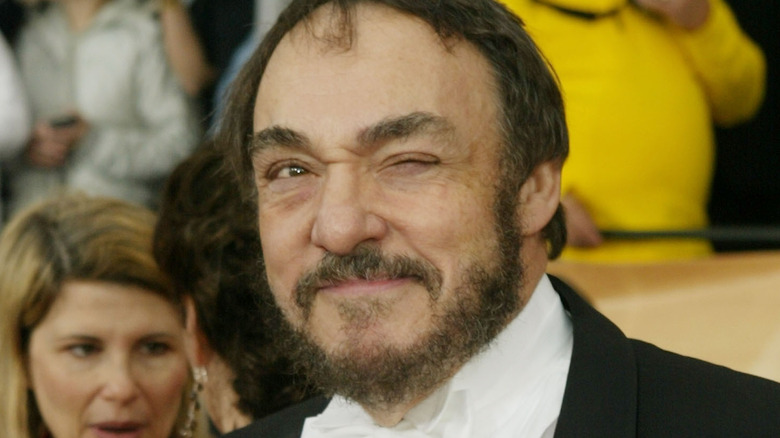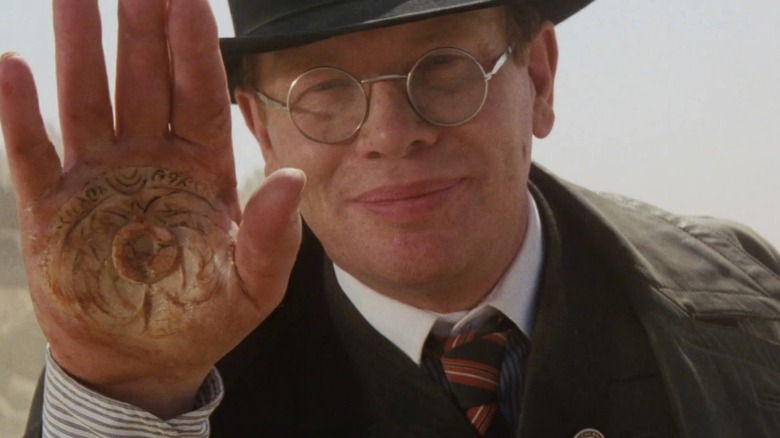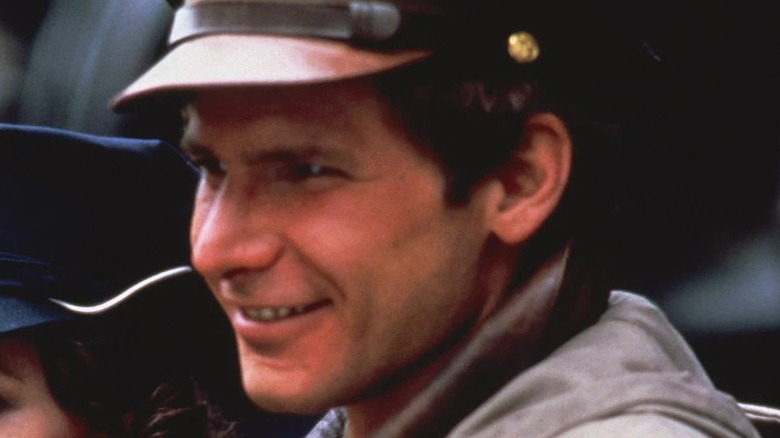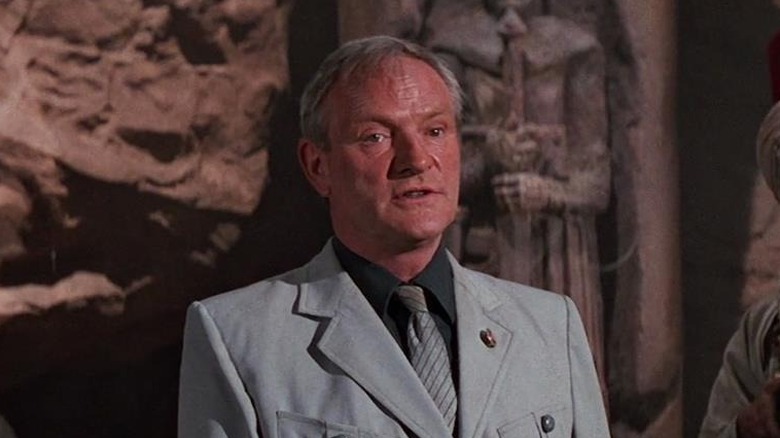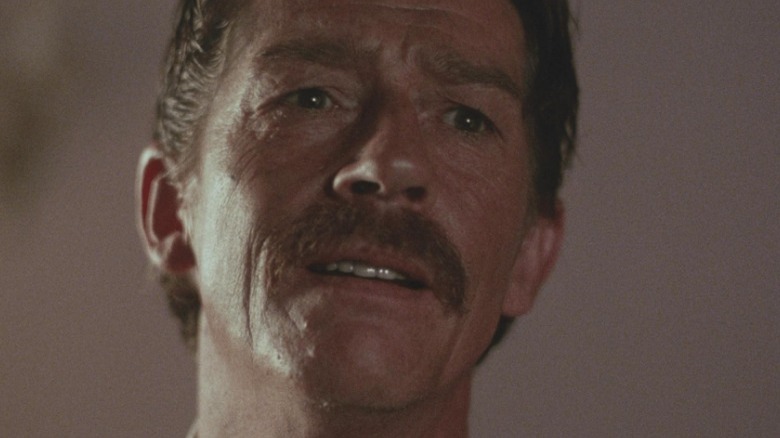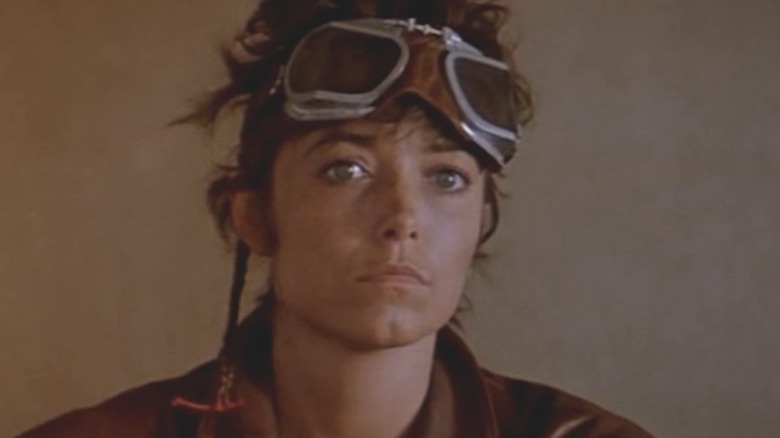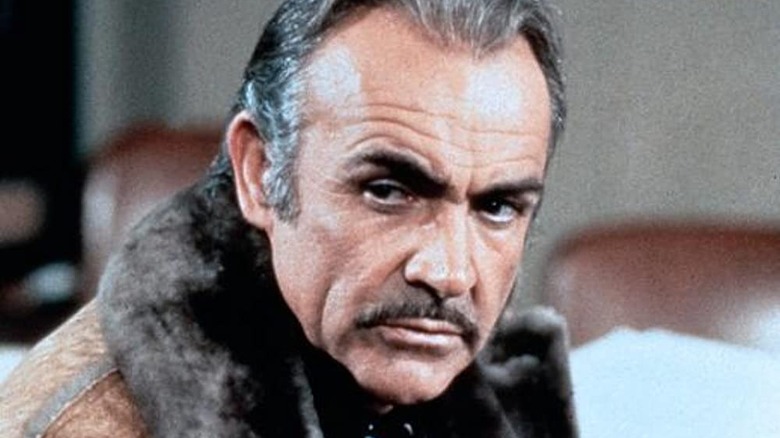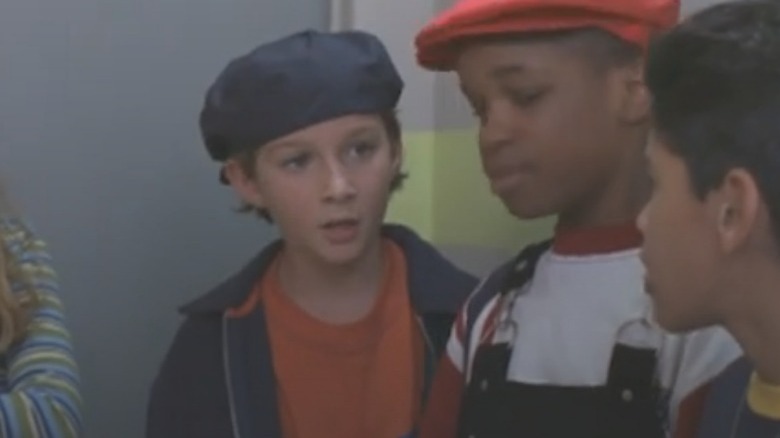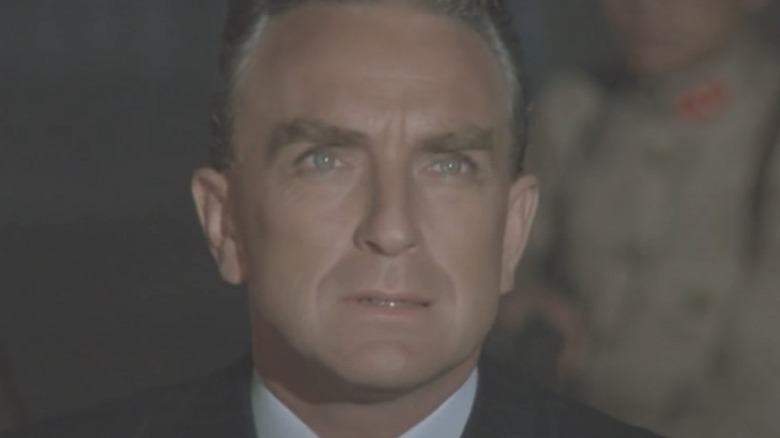Early Roles That Indiana Jones Actors Would Like You To Forget About
With four films and counting, the "Indiana Jones" movie franchise boasts a collection of stars to rival any other. A mix of well-respected character actors, Oscar-winning superstars, Hollywood veterans, and emerging young talent, the cast of the series just kept getting better with each film. With so many accomplished and talented actors in front of the camera, you might think they all look back on their careers with nothing but pride.
But think again, because no actor is without a stain on their resume, and the roster of "Indiana Jones" stars is no exception. Whether it's a misguided disaster movie, an early flop, or a production gone wrong, they all have at least one they'd like to bury. Even Indiana himself, Harrison Ford, can look back sheepishly on a past production. Maybe they'd prefer it if we didn't highlight them all for our readers, but you're in luck, because we've taken a look back and found a host of horribly flawed films they'd all wish us to forget.
Kate Capshaw in Best Defense
For the 1984 prequel "Indiana Jones and the Temple of Doom," director Steven Spielberg cast up-and-coming actress Kate Capshaw in just her second feature film. She took on the role of Willie Scott, a bumbling blonde nightclub singer who gets swept up in intrepid Dr. Jones' quest to find the legendary Shankara stone in India. Capshaw and Spielberg married years later, and the actress retired from acting not long after. But even though Capshaw has a relatively small filmography, she's made at least one movie she'd rather erase from history: the comedy "Best Defense," which hit theaters just two months after "Temple of Doom."
Built around rising star Eddie Murphy and fading star Dudley Moore, the film centered on two men involved in the making and deployment of a new military weapons system. Moore designed the thing, and Murphy is a soldier in the field trying to use it, but the two actors never once meet, which is just the beginning of this movie's problems. Capshaw stars as Laura Cooper, wife to Moore's character, who provides little more than a female body for the movie to make a bunch of bad sex jokes about.
Surprisingly, the film was written by Willard Huyck and Gloria Katz, the same husband-and-wife team that wrote "Temple of Doom" and the George Lucas classic "American Graffiti." The New York Times cracked the whip on this one, noting, "It really isn't easy to make a movie as mind-bendingly bad as ”Best Defense.”'
Andrew Divoff in Dangerous Touch
Audiences may know Andrew Divoff best from roles outside of his minor appearance in "Indiana Jones and the Kingdom of the Crystal Skull," where he played — perhaps predictably — a Russian soldier serving under Colonel Dovchenko. Divoff has seemingly made a career out of playing enemy agents in movies like "Air Force One" — again opposite Harrison Ford — and in TV shows like "Lost" and "The Blacklist." With a long list of credits to his name, there's any number of roles he might like us to forget — including "Mac and Me," a movie that's so bad it's good. But there's another that has no such redeeming qualities.
Enter 1993's "Dangerous Touch," an erotic thriller written and directed by, and also starring, Lou Diamond Phillips. Opposite Phillips is future "Battlestar Galactica" femme fatale Kate Vernon as Amanda, a celebrity therapist who becomes the target of a mysterious man named Mike (Phillips). The latter is after more than just the nearly X-rated action we see the two involved in frequently throughout the film. Divoff plays Johnny, a thug who pressures Mike to get what they need from her.
The problem isn't just that the movie is terrible, with the worst performances this side of a middle school play, but that it crosses into pure adult entertainment rather quickly and shamelessly. That Phillips wrote and directed the film for himself to star in, opposite a beautiful young actress that he gets horizontal with graphically and frequently, also makes it an incredibly uncomfortable watch.
Denholm Elliott in It's Not The Size That Counts
Get ready folks, because we're going off the deep end with this one. Two-time "Indiana Jones" co-star Denholm Elliott is well-known to fans for playing the hero's academic ally Marcus Brody in "Raiders of the Lost Ark" and "Indiana Jones and the Last Crusade." But fans may not know that the late Elliott was a renowned English character actor who had appeared in dozens of memorable films like "Alfie" and "A Bridge Too Far."
With such a robust resume, it's inevitable that he'd have at least one movie that probably still makes him roll over in his grave. For Elliott, "It's Not The Size That Counts" is the one. A 1974 farce also known as "Percy's Progress," the film is about Percy, a man who gets the first-ever sexual organ transplant not long before a chemical in the water supply turns the male population impotent, leaving him the only man in the world with a working willy. Suddenly he's the object of every woman's desire, and the military must keep him safe for the future of humanity.
Not only is the story ridiculous and childish, but it's not even funny, full of flaccid jokes and limp performances by a cast who seem embarrassed just to be there. Unable to market the film based on its actual plot, the trailer resorts to winks and nods to get its point across without enraging the censors. The truly amazing thing about it, however, is that this is actually a sequel to a 1971 film, "Percy."
John Rhys-Davies in Goddess Of Love
Believe it or not, this might be the most ridiculous film on this list, and that's saying something. But in 1988, game show assistant and all-around beauty queen Vanna White of "Wheel of Fortune" was at the height of her popularity, so someone had the bright idea to give her a TV movie of her very own. That's certainly an idea that's worked before, but the problem here is that the best they could come up with was a movie about the Greek goddess of legend, Venus.
John Rhys-Davies, a year before his return as Sallah in "Indiana Jones and the Last Crusade," stars as the king of the gods himself, Zeus. He decides that Venus needs to be punished and turns her into a statue, only for her to come to life again in what is apparently the present day of 1988 — although it's inexplicably only ever referred to as "some day." There she must find true love if she wants back into Olympus.
An awkward and uncomfortable mix of elements from movies like "Mannequin" and "Splash," the film only serves to illustrate one thing: Vanna White can't act. But the material doesn't do her any favors either, asking her to deliver lines straight out of a comic book or doing scenes where she has to look sexy eating fried chicken.
Ronald Lacey in Disciple Of Death
Character actor Ronald Lacey may not have been the main villain of "Raiders of the Lost Ark," but for many he was the most memorable, playing Arnold Toht, the twisted Gestapo agent assigned to hunt down Marion Ravenwood and acquire the medallion that will lead to the Ark of the Covenant. In the end, he's melted by the supernatural powers of the ancient relic itself, in one of the series' most iconic — and horrific — onscreen moments.
Lacey had a long career in Hollywood before that, with a number of mostly average and forgettable films across just about every genre under his belt. But one movie he'd probably want us all to actually forget is the 1972 horror film, "Disciple of Death." Set in 18th century England, the film is a vampire movie of sorts, with a undead lord brought back to life by happenstance. With the help of a dwarf, this minion of Satan goes on a killing spree targeting young women, and is opposed by a clergyman and his sarcastic best friend.
Cheaply made and lacking anything remotely entertaining for fans of the genre, "Disciple of Death" has mostly fallen into obscurity over the years. Retro reviewers label it among the most abominable horror flicks around. Chris Wood of British Horror Films called it "the worst film I have ever seen ... a stinker of remarkable ineptitude," while The Spinning Image's review called it "underwhelming and a little embarrassing."
Harrison Ford in Hanover Street
Before he was Indiana Jones, star Harrison Ford was also of course Han Solo, but in the short period of time between his first turns in those two iconic roles, the actor did a handful of other, now largely forgotten films. A couple, like "Force 10 From Navarone" and "The Frisco Kid," are remembered mostly for Ford's role in them, but there's one that he's probably thrilled that most audiences have forgotten — the 1979 flop "Hanover Street."
A romantic war movie intended to be in the vein of classics like "Casablanca" or "Lawrence of Arabia," the film stars Ford as American pilot David Halloran, who falls in love with a beautiful married nurse named Margaret (Lesley-Anne Down). In the middle of their affair, Halloran is tasked with transporting a government agent behind enemy lines for a mission vital to the war effort. The British Intelligence agent just so happens to be Margaret's husband Peter, and now they must work together to survive in occupied France.
Far too cliched, with plot beats that strain believability and dialogue that makes it feel more like a spoof than an actual war movie, "Hanover Street" is as stiff and lifeless as a golden idol, with none of the shine. As the New York Times called it in their review, it's "painstaking, overripe foolishness" that was better for a laugh than any real drama.
Julian Glover and John Rhys-Davies in Tusks
One of the biggest surprises of "Indiana Jones and the Last Crusade" was Julian Glover as Walter Donovan, a wealthy magnate on a search for the mythical Holy Grail. Initially introduced as a minor character, the reveal that he's actually the villain is a good one. He ultimately meets his end via a sip from the wrong chalice, but his impact on "Indiana Jones" was memorable. Glover has never been a stranger to big franchises either, with appearances ranging from "Doctor Who" in the 1970s to "Harry Potter" in the 2000s. He's not always been in hits, however, and one 1988 flop he'd love to forget, "Tusks," also happens to star John Rhys-Davies.
Sometimes known under the embarrassing title of "African Amok," the film begins with a park ranger in Africa, Ian Taylor (Glover), inviting a wealthy artist to his preserve to help expose the danger posed to the great elephants there, mainly by vicious animal poachers. One such ivory hunter is Roger Singh (Rhys-Davies), a ruthless madman obsessed with getting what he wants. He is opposed by another ranger, Mark Smith, who once helped get Singh sent away to prison.
While a troubled production may explain the problems with the film, it doesn't change the fact that the movie is an incoherent mess. With improvised dialogue, stiff performances, a nonsensical plot, and an awkward love scene featuring Rhys-Davies, both he and Glover are likely thankful that the film was barely released in America.
John Hurt in Jake Speed
John Hurt was already an acting icon when he joined the cast of "Indiana Jones and the Kingdom of the Crystal Skull" in 2008. He had already appeared in some of Hollywood's most enduring franchises, including "Alien" and "Harry Potter," and joined British TV institution "Doctor Who" in 2013. Hurt rose to renown in the 1970s, thanks to his role as Roman emperor Caligula in the award-winning BBC drama "I, Claudius." But not all of his films have become classics — especially his 1986 adventure "Jake Speed."
Oddly enough, "Jake Speed" is a movie in the same vein as "Indiana Jones" itself — a modern take on classic pulps — but this time with a more comedic tilt. The story involves a young woman whose sister goes missing, kidnapped by slave traders, but who gets help from a hero named Jake Speed. A daring do-gooder, Jake's supposed to be a fictional character but is actually a real person. Hurt appears as the devilish white slaver Sidney Widgeway, yet despite an appropriately over-the-top performance, he can't save the film from being one of the worst in his filmography.
A story that feels like a mix of "Romancing the Stone" and "Last Action Hero," its biggest downfall is the movie's star, Wayne Crawford, who is completely devoid of charm. For a film that's supposed to be lampooning old adventures, it takes itself far too seriously and decides to go for dark drama over the light-hearted fun of "Indiana Jones."
Karen Allen in Terminus
Just three years after her film debut in "National Lampoon's Animal House," actress Karen Allen got the role of a lifetime as Marion Ravenwood, fellow adventurer and love interest to Indiana Jones in "Raiders of the Lost Ark." You'd think that impressing audiences as the female lead in one of the decade's biggest hits would have catapulted her to numerous major movie roles, but Allen seemed to struggle through the '80s with finding good parts, leading to at least one she probably hopes stays obscure: in the 1987 science fiction adventure "Terminus."
One of the many '80s movies inspired by "Mad Max," the film is set in a post-apocalyptic dystopia where cars and trucks dominate a devastated landscape. The plot concerns a cross-country race lead by a highly advanced truck called Monster, driven by a tough-as-nails woman named Gus (Allen). Along the way, she'll face down a number of dangers, obstacles, and rivals, including a gang of warriors dressed in leather who prove more dangerous than any road hazard.
Like most "Mad Max" clones of the day — such as "Battletruck" and "The New Barbarians" – the movie's low budget is painfully obvious throughout. A lame, lifeless story that is both overly cliched and unfortunately vague — plus a woeful cast of low-rent actors — leave this one among the most forgettable of the bunch.
Sean Connery in Meteor
After two big hits with "Raiders of the Lost Ark" and "Temple of Doom," it was time for "Indiana Jones" to go even bigger for the threequel, and "The Last Crusade" did it by introducing the whip-wielding relic hunter's estranged father, played by the legendary Sean Connery. Teaming up with Indy, Henry Jones Sr. sets out to find nothing less than the Holy Grail. Bolstered by Connery's impeccable performance, the film became one of the biggest blockbusters of 1989 and a favorite of fans everywhere. Beyond "Jones" and his decade as James Bond, however, Connery is not without his duds.
One late '70s entry that the actor would love us all to erase from our collective consciousnesses might be the disaster film "Meteor." The film, inspired by the 1967 MIT report "Project Icarus," stars Connery as Dr. Paul Bradley, a scientist who has devised a nuclear missile platform to thwart an incoming city-sized asteroid that threatens to destroy the Earth. Though no different than most films of its type released around the same time, "Meteor" — despite its all-star cast that includes Natalie Wood and Henry Fonda — was one of the worst of the bunch.
All of the nail-biting suspense you'd expect from a movie like this was entirely absent, along with interesting characters, impressive effects, and surprising twists and turns. A great disaster of a film rather than a great disaster film, Connery could do without this one marring his filmography.
Shia LaBeouf in Monkey Business
When a fourth "Indiana Jones" film was announced and audiences learned that it would introduce the hero's son, they may have expected a modern-day Harrison Ford type. Fans were surprised, however, to learn that rising star Shia LaBeouf, fresh off his role as Sam Witwicky in Michael Bay's blockbuster "Transformers" movie, would take on the role of Jones' punk kid, Mutt Williams. Getting his start on the Disney Channel's "Even Stevens" in the early 2000s, LaBeouf went on to become Hollywood's go-to smarmy teen sidekick in movies like "I, Robot," and "Constantine."
He was no stranger to big flops though, and if there's any movie the complicated actor would like us to forget, it's likely one of his earliest, the 1998 kid's comedy, "Monkey Business." Starring Richard Moll and Billy Drago, the movie finds a pair of crooks looking for revenge on the cop who put them away. A group of young kids, including newcomer Wyatt (LaBeouf), are there to help stop them. If you thought that wasn't enough of a premise, the kids are helped by a monkey and some animals who have escaped a zoo.
Looking like it was filmed on a home camcorder over a weekend by a bunch of kid filmmakers, the movie isn't even good enough to pass for a Disney Channel original. With an impossibly pathetic premise, zero charm, and terrible kid actors — including LaBeouf — the actor probably wishes he could capture every copy and lock them up forever.
Paul Freeman in Shanghai Surprise
The first true villain to clash with Indiana Jones, actor Paul Freeman played the sinister Belloq in "Raiders of the Lost Ark," a Nazi sympathizer who is hired by Adolf Hitler to locate the Ark of the Covenant. A Frenchman and hunter of great antiquities, his quest to find the Ark ultimately leads to his grisly, head-melting downfall during the film's climax. Freeman was mostly a British TV performer at the time of his casting, but became a journeyman Hollywood character actor after doing "Raiders." Of all the films he starred in afterwards, "Shanghai Surprise" remains his biggest disaster.
Starring Sean Penn and Madonna — who were married in real life at the time — the film takes clear inspiration, oddly enough, from "Indiana Jones" itself as a pulp-inspired adventure. It's the story of a con man (Penn) who is hired by a missionary (played by Madonna) to procure a supply of a valuable drug to medicate suffering patients. The pursuit however puts him in the crosshairs of gangs, crooks, and even some U.S. Air Force pilots.
A lavish production that at least looks great, "Shanghai Surprise" unfortunately fails at everything else. Madonna is miscast, Penn is no Harrison Ford, and in return, nobody showed up to watch it. AV Club said it was only "limply, tardily trying to cash in on the success of the 'Indiana Jones' movies" while The New York Times called it a "listless bore."
